全国少儿英语等级考试二语法疑问句
少儿英语二考试口试知识点
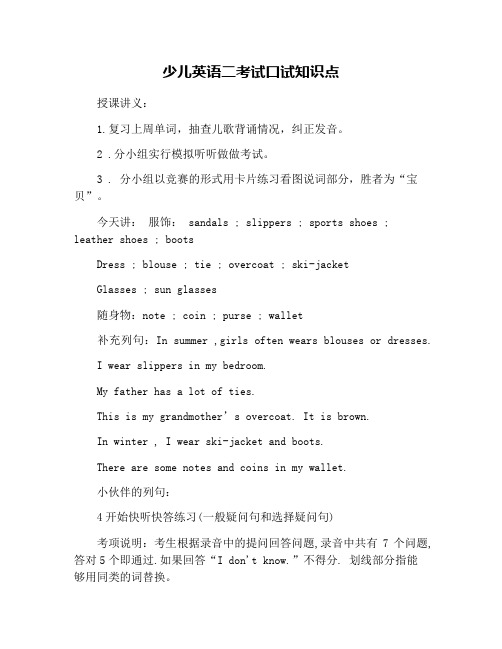
少儿英语二考试口试知识点授课讲义:1.复习上周单词,抽查儿歌背诵情况,纠正发音。
2 .分小组实行模拟听听做做考试。
3 . 分小组以竞赛的形式用卡片练习看图说词部分,胜者为“宝贝”。
今天讲:服饰: sandals ; slippers ; sports shoes ; leather shoes ; bootsDress ; blouse ; tie ; overcoat ; ski-jacketGlasses ; sun glasses随身物:note ; coin ; purse ; wallet补充列句:In summer ,girls often wears blouses or dresses.I wear slippers in my bedroom.My father has a lot of ties.This is my grandmother’s overcoat. It is brown.In winter , I wear ski-jacket and boots.There are some notes and coins in my wallet.小伙伴的列句:4开始快听快答练习(一般疑问句和选择疑问句)考项说明:考生根据录音中的提问回答问题,录音中共有7个问题,答对5个即通过.如果回答“I don't know.”不得分. 划线部分指能够用同类的词替换。
Do/Does…? Yes, I do. /No, I don’t. Yes, we do. /No, we don’t. Yes, they do. /No, they don’t. Yes, it does. / No,it doesn’t. Yes, he/she does. /No, he/she doesn’t.1.Do you like to swim in winter? Yes, I do.2.Do you like to eat pizza? Yes, I do.3.Do you have any books? Yes, I do.4.Do you have lessons on Sundays? Yes, I do.5.Do you and your classmates eat lunch at school? Yes, we do.6.Do your parents like to travel abroad? Yes, they do.7.Does it often rain in Shanghai in summer? Yes, it does.8.Does it cold in Shanghai in winter? Yes, it does.9.Does it cold in Australia in winter? No, it doesn’t.10.Does Spring come after Summer? No, it isn’t.11.Does your mother do the housework in your family? Yes, she does.12.Does your father go to work by bike? Yes, he does.13.Do you like to swim or play table tennis at the weekend? Play table tennis.14.Does your grandpa like skating or skiing? Skiing.15.Do you go to school by car or by bus? By bus.16.Does your mother like to drink orange juice or apple juice? Apple juice?。
剑桥少儿英语二级主要句型
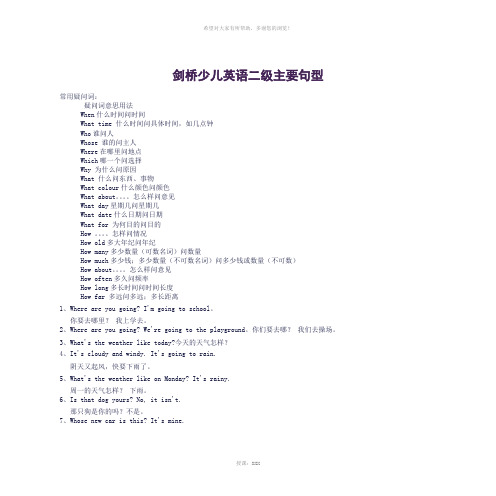
剑桥少儿英语二级主要句型常用疑问词:疑问词意思用法When什么时间问时间What time 什么时间问具体时间,如几点钟Who谁问人Whose 谁的问主人Where在哪里问地点Which哪一个问选择Why 为什么问原因What 什么问东西、事物What colour什么颜色问颜色What about。
怎么样问意见What day星期几问星期几What date什么日期问日期What for 为何目的问目的How 。
怎样问情况How old多大年纪问年纪How many多少数量(可数名词)问数量How much多少钱;多少数量(不可数名词)问多少钱或数量(不可数)How about。
怎么样问意见How often多久问频率How long多长时间问时间长度How far 多远问多远;多长距离1、Where are you going? I'm going to school。
你要去哪里?我上学去。
2、Where are you going? We're going to the playground。
你们要去哪?我们去操场。
3、What's the weather like today?今天的天气怎样?4、It's cloudy and windy. It's going to rain.阴天又起风,快要下雨了。
5、What's the weather like on Monday? It's rainy.周一的天气怎样?下雨。
6、Is that dog yours? No, it isn't.那只狗是你的吗?不是。
7、Whose new car is this? It's mine.这是谁的新车子?是我的。
8、Is it Peter's? Sorry, I don't know.是彼得的吗?我不知道。
9、Do you often play football? Yes, I do.你经常踢足球吗?是的。
全国少儿英语考级语法
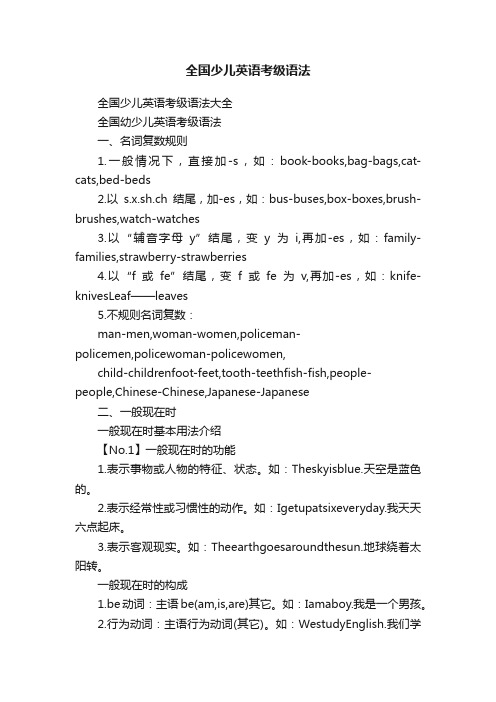
全国少儿英语考级语法全国少儿英语考级语法大全全国幼少儿英语考级语法一、名词复数规则1.一般情况下,直接加-s,如:book-books,bag-bags,cat-cats,bed-beds2.以s.x.sh.ch结尾,加-es,如:bus-buses,box-boxes,brush-brushes,watch-watches3.以“辅音字母y”结尾,变y为i,再加-es,如:family-families,strawberry-strawberries4.以“f或fe”结尾,变f或fe为v,再加-es,如:knife-knivesLeaf——leaves5.不规则名词复数:man-men,woman-women,policeman-policemen,policewoman-policewomen,child-childrenfoot-feet,tooth-teethfish-fish,people-people,Chinese-Chinese,Japanese-Japanese二、一般现在时一般现在时基本用法介绍【No.1】一般现在时的功能1.表示事物或人物的特征、状态。
如:Theskyisblue.天空是蓝色的。
2.表示经常性或习惯性的动作。
如:Igetupatsixeveryday.我天天六点起床。
3.表示客观现实。
如:Theearthgoesaroundthesun.地球绕着太阳转。
一般现在时的构成1.be动词:主语be(am,is,are)其它。
如:Iamaboy.我是一个男孩。
2.行为动词:主语行为动词(其它)。
如:WestudyEnglish.我们学习英语。
当主语为第三人称单数(he,she,it)时,要在动词后加"-s"或"-es"。
如:MarylikesChinese.玛丽喜欢汉语。
【No.2】一般现在时的变化1.be动词的变化。
否定句:主语benot其它。
最新剑桥少儿英语二级上1知识点总结
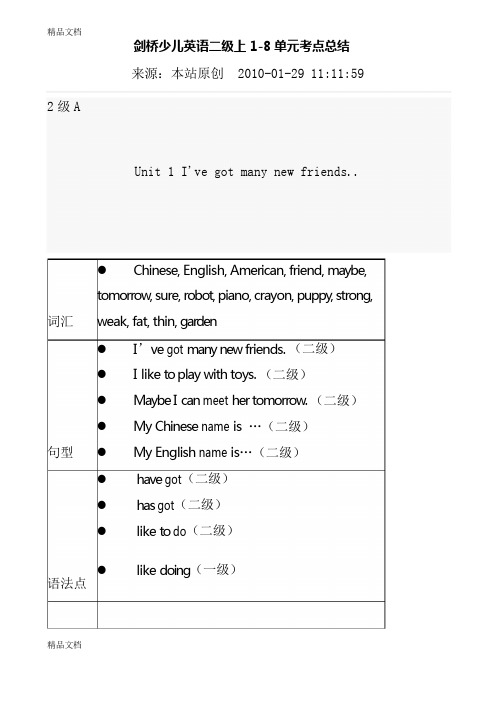
精品文档剑桥少儿英语二级上1-8单元考点总结来源:本站原创2010-01-2911:11:59 2级AUnit1I've got many new friends..词汇句型语法点●Chinese,English,American,friend,maybe, tomorrow,sure,robot,piano,crayon,puppy,strong, weak,fat,thin,gar den●I’ve got many new friends.(二级)●I like t o play with toys.(二级)●Maybe I can meet her tomorrow.(二级)●My Chinese name is…(二级)●My English name is…(二级)●have got(二级)●has got(二级)●like t o do(二级)●like doing(一级)自然拼a,e,o读Unit2Is this book yours?词汇●mine,yours,his,hers,its,ours,theirs(名词性物主代词)bat,fan,tank,bank,hand(一词多义)●Is this your book?Yes,it’s mine./No,it’s n o t mine.●This book is n o t yours.(二级)●Maybe you can ask Bob.(二级)●His bear d is short,bu t his is long.(二级)句型语法点形容词性物主代词自然拼a读Unit3Our school is beautiful.●round,square,quiet,thirsty,hungry,tired,beautiful,different,famous,thin(形容词,二级)sports centre,dining room,classroom,swimmingpool,library,café,shop,bank,gar den词汇●Where do you often play sports?(一级)I often play sports on the…●We’ve got a big library,a playground,a prettygarden and many classrooms.●Where is Mr.White?●This is the place where children can buythings.句型●一般现在时(一级主要时态)语法点●Where引导的特殊疑问句Unit4Miss,can I ask you a question?●question,riddle,picture,Chinese,English,try,enjoy,sandwich,sure,mean●straight---curly;plus---minus(反义词)comic,film,video,jungle,address,balcony,town词汇●May I sit here?(二级)●May I come in?(二级)●Excuse me,can I use the b ath r o om for aminute?(一级)●Shall I help you mak e sandwiches?(二级)句型语法点●情态动词can/may/shall的用法。
剑桥少儿英语二级主要句型
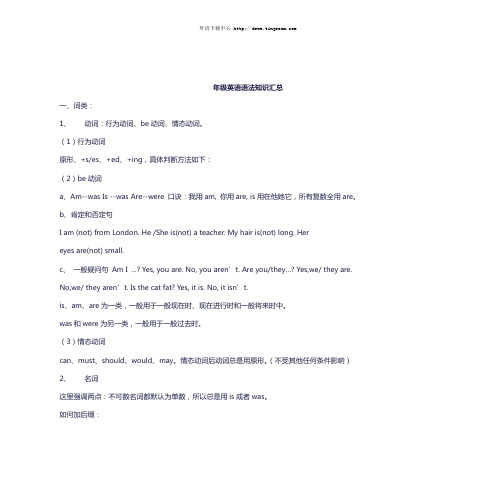
年级英语语法知识汇总一、词类:1、动词:行为动词、be动词、情态动词。
(1)行为动词原形、+s/es、+ed、+ing,具体判断方法如下:(2)be动词a、Am--was Is --was Are--were 口诀:我用am, 你用are, is用在他她它,所有复数全用are。
b、肯定和否定句I am (not) from London. He /She is(not) a teacher. My hair is(not) long. Hereyes are(not) small.c、一般疑问句Am I …? Yes, you are. No, you aren’t. Are you/they…? Yes,we/ they are. No,we/ they aren’t. Is the cat fat? Yes, it is. No, it isn’t.is、am、are为一类,一般用于一般现在时、现在进行时和一般将来时中。
was和were为另一类,一般用于一般过去时。
(3)情态动词can、must、should、would、may。
情态动词后动词总是用原形。
(不受其他任何条件影响)2、名词这里强调两点:不可数名词都默认为单数,所以总是用is或者was。
如何加后缀:a.一般情况下,直接加-s,如:book-books, bag-bags, cat-cats, bed-bedsb.以s. x. sh. ch结尾,加-es,如:bus-buses, box-boxes, brush-brushes, watch-watchesc.以“辅音字母+y”结尾,变y为i, 再加-es,如:family-families, strawberry-strawberriesd.以“f或fe”结尾,变f或fe为v, 再加-es,如:knife-knivese.不规则名词复数:man-men, woman-women, policeman-policemen, policewoman-policewomen, mouse-mice child-children foot-feet ,.tooth-teeth fish-fish, people-people,Chinese-Chinese, Japanese-Japanese3、形容词(包括副词)形容词表示某一事物或的特征,副词表示某一动作的特征。
青少版二知识点
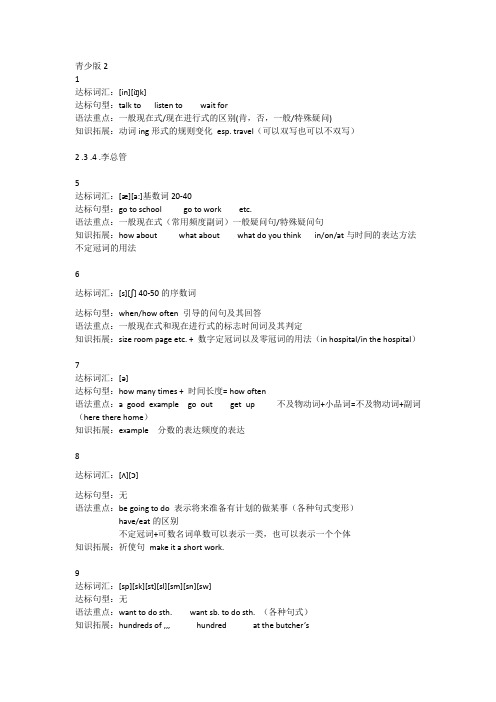
青少版21达标词汇:[in][iŋk]达标句型:talk to listen to wait for语法重点:一般现在式/现在进行式的区别(肯,否,一般/特殊疑问)知识拓展:动词ing形式的规则变化esp. travel(可以双写也可以不双写)2 .3 .4 .李总管5达标词汇:[æ][a:]基数词20-40达标句型:go to school go to work etc.语法重点:一般现在式(常用频度副词)一般疑问句/特殊疑问句知识拓展:how about what about what do you think in/on/at与时间的表达方法不定冠词的用法6达标词汇:[s][ʃ] 40-50的序数词达标句型:when/how often 引导的问句及其回答语法重点:一般现在式和现在进行式的标志时间词及其判定知识拓展:size room page etc. + 数字定冠词以及零冠词的用法(in hospital/in the hospital)7达标词汇:[ə]达标句型:how many times + 时间长度= how often语法重点:a good example go out get up 不及物动词+小品词=不及物动词+副词(here there home)知识拓展:example 分数的表达频度的表达8达标词汇:[ʌ][ɔ]达标句型:无语法重点:be going to do 表示将来准备有计划的做某事(各种句式变形)have/eat的区别不定冠词+可数名词单数可以表示一类,也可以表示一个个体知识拓展:祈使句make it a short work.9达标词汇:[sp][sk][st][sl][sm][sn][sw]达标句型:无语法重点:want to do sth. want sb. to do sth. (各种句式)知识拓展:hundreds of ,,, hundred at the butcher’s男性理发师barber女性hairdress10达标词汇:无达标句型:无语法重点:’s的名词所有格/is的缩写一般现在式:反复发生的事情be going to:将要发生的事情take/bring的区别感官动词可以作为系动词用Have可以强调经历知识拓展:连读11达标词汇:复习1-10基数词序数词达标句型:we all have our troubles语法重点:一般过去式表示状态用was/were表示表示地点的介词的用法一般将来式的时间表达知识拓展:各种谚语be的弱读12达标词汇:[s][z][iz] 复习序数词11-20达标句型:无语法重点:一般过去式状态表达用were知识拓展:年月日的表达13达标词汇:[tr][dr]达标句型:there be的一般过去式(各种句式)语法重点:in + 时间长度表示一段时间之内a few/a little的区别知识拓展:no/none/not any的区别程度副词14达标词汇:[æ][ʌ]达标句型:first love second love语法重点:实义动词构成的一般过去式知识拓展:无15达标词汇:[ʃ][tʃ]达标句型:无语法重点:一般过去式instead have a (swim/bath/shower/day out/nap/ride/rest) 知识拓展:无16达标词汇:[t][d]达标句型:肯定句的翻译疑问句语法重点:同上+ 动词过去式的读法知识拓展:名字的表达动词的固定搭配(32课Pattern Practice)17达标词汇:[id]达标句型:无语法重点:一般过去式的标志性时间短语副词修饰动词/形容词/副词知识拓展:无18达标词汇:[ps][ts][ks][sp][sk][st]达标句型:无语法重点:祈使句36课的动词过去式的不规则变化知识拓展:无19达标词汇:复习整百的数词基数词达标句型:无语法重点:动词过去式的不规则变化知识拓展:tell/speak/talk/say的区别20达标词汇:无达标句型:特殊疑问句40课语法重点:be going to do/will的区别否定翻译疑问句知识拓展:无21达标词汇:无达标句型:无语法重点:42课的时间表(过去式中所用时间短语以及其对应的将来式所用时间短语)知识拓展:fortnight22达标词汇:无达标句型:there be句型的一般将来式语法重点:understand/clear be动词的一般将来式知识拓展:till/until23达标词汇:长宽高的名词和形容词[e][ei]达标句型:how + adj.(tall/far/deep/long etc.)语法重点:by+时间点表示动作发生在该时间点之前知识拓展:quiet/quite区别-24达标词汇:[l][r]达标句型:无语法重点:比较级/最高级知识拓展:quiz/exam/examination/test tall/high people/person25达标词汇:[tr][dr][tʃ][dʒ]达标句型:无语法重点:比较级的同级比较(as…as…not so…as…)the same a little/a few的区别知识拓展:be made of…be made in…tell sth. to sb.26达标词汇:无达标句型:what is one’s report like?问成绩语法重点:成绩的表达方法bad/well/good/nice的区别知识拓展:rather/quite27达标词汇:无达标句型:无语法重点:borrow/lend at the beginning of the month(时间状语)lend sb. sth. Few/little的比较级 a lot of/many/much的比较级知识拓展:cost/spend/pay/take28达标词汇:[l][n]达标句型:无语法重点:形容词比较级/最高级(more/most) opinion/think of知识拓展:some/any/no + one/day29达标词汇:无达标句型:无语法重点:数词+比较级的用法 e.g. He is two years older than me.知识拓展:形容词的不规则变化e.g. far/further30达标词汇:无达标句型:无语法重点:enjoysth. enjoy doing sth. 花费金钱与付出金钱的联系与区别知识拓展:in the morning与on Sunday morning的区别。
新概念青少版2A复习总结材料(语法)
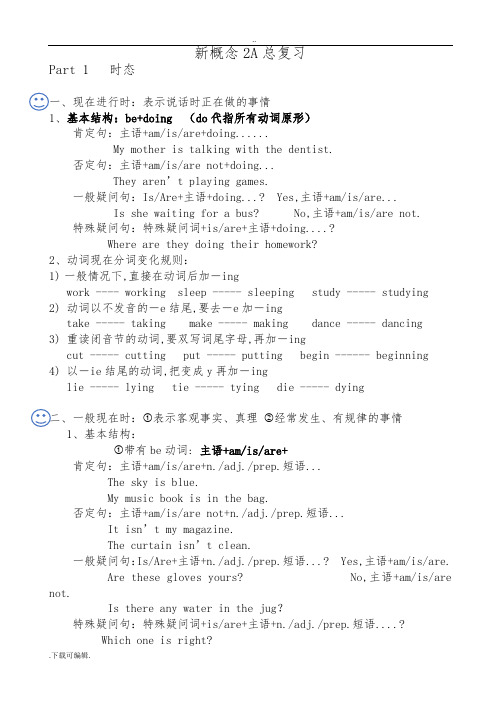
新概念2A总复习Part 1 时态、基本结构:be+doing (do代指所有动词原形)肯定句:主语+am/is/are+doing......My mother is talking with the dentist.否定句:主语+am/is/are not+doing...They aren’t playing games.一般疑问句:Is/Are+主语+doing...? Yes,主语+am/is/are...Is she waiting for a bus? No,主语+am/is/are not.特殊疑问句:特殊疑问词+is/are+主语+doing....?Where are they doing their homework?2、动词现在分词变化规则:1)一般情况下,直接在动词后加-ingwork ---- working sleep ----- sleeping study ----- studying2) 动词以不发音的-e结尾,要去-e加-ingtake ----- taking make ----- making dance ----- dancing3) 重读闭音节的动词,要双写词尾字母,再加-ingcut ----- cutting put ----- putting begin ------ beginning4) 以-ie结尾的动词,把变成y再加-inglie ----- lying tie ----- tying die ----- dying①表示客观事实、真理②经常发生、有规律的事情1、基本结构:①带有be动词: 主语+am/is/are+肯定句:主语+am/is/are+n./adj./prep.短语...The sky is blue.My music book is in the bag.否定句:主语+am/is/are not+n./adj./prep.短语...It isn’t my magazine.The curtain isn’t clean.一般疑问句:Is/Are+主语+n./adj./prep.短语...? Yes,主语+am/is/are.Are these gloves yours? No,主语+am/is/are not.Is there any water in the jug?特殊疑问句:特殊疑问词+is/are+主语+n./adj./prep.短语....?Which one is right?Who is the man in a black hat?带有实义动词:主语+(never/sometimes/often/usually/always )v.原形/v.三单+....(肯定句:主语+v.原形/三单+.......They usually live in dry places. It sometimes rains in summer. 否定句:主语+don ’t /doesn ’t +v.原形+....... We don ’ Linda doesn ’一般疑问句:Do/Does+主语+v.原形.......? Yes,主语+do/does. Do you always arrive at school very early? No,主语+don ’t/doesn ’t.Does Lucy have a rest every afternoon?特殊疑问句:特殊疑问词+do/does+主语+v.原形.......?2、动词第三人单数变化规则: 1)一般直接在动词尾直接加 s.如:play —plays, want —wants, work — know —knows,help —helps, get — 2)以字母s 、x 、ch 、sh 结尾的动词加 guess —guesses,fix —fixes,teach —teaches,brush —brushes, watch —watches,catch —catches3)以辅音字母+y 结尾的动词,先变y 为i,再加-es.发音/z/如:study —studies,carry —carries,fly —flies,worry —worries1、学生们在干什么?有一些在打,另一些躺在沙滩上。
新概念青少版2A复习总结(语法)
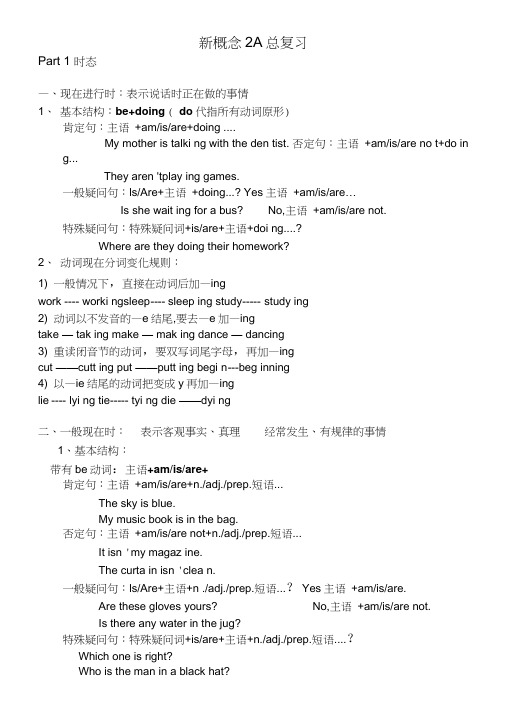
新概念2A总复习Part 1 时态—、现在进行时:表示说话时正在做的事情1、基本结构:be+doing ( do代指所有动词原形)肯定句:主语+am/is/are+doing ....My mother is talki ng with the den tist. 否定句:主语+am/is/are no t+do ing...They aren 'tplay ing games.一般疑问句:ls/Are+主语+doing...? Yes主语+am/is/are…Is she wait ing for a bus? No,主语+am/is/are not.特殊疑问句:特殊疑问词+is/are+主语+doi ng....?Where are they doing their homework?2、动词现在分词变化规则:1) 一般情况下,直接在动词后加—ingwork ---- worki ngsleep ---- sleep ing study ----- study ing2) 动词以不发音的—e结尾,要去—e加—ingtake — tak ing make — mak ing dance — dancing3) 重读闭音节的动词,要双写词尾字母,再加—ingcut ——cutt ing put ——putt ing begi n ---beg inning4) 以—ie结尾的动词把变成y再加—inglie ---- lyi ng tie ----- tyi ng die ——dyi ng二、一般现在时:表示客观事实、真理经常发生、有规律的事情1、基本结构:带有be动词:主语+am/is/are+肯定句:主语+am/is/are+n./adj./prep.短语...The sky is blue.My music book is in the bag.否定句:主语+am/is/are not+n./adj./prep.短语...It isn 'my magaz ine.The curta in isn 'clea n.一般疑问句:ls/Are+主语+n ./adj./prep.短语...? Yes主语+am/is/are.Are these gloves yours? No,主语+am/is/are not.Is there any water in the jug?特殊疑问句:特殊疑问词+is/are+主语+n./adj./prep.短语....?Which one is right?Who is the man in a black hat?带有实义动词:主语+(never/sometimes/often/usually/always )v•原形/v.三单+・・・・(every morning/day/week.)1、学生们在干什么?有一些在打电话,另一些躺在沙滩上。
- 1、下载文档前请自行甄别文档内容的完整性,平台不提供额外的编辑、内容补充、找答案等附加服务。
- 2、"仅部分预览"的文档,不可在线预览部分如存在完整性等问题,可反馈申请退款(可完整预览的文档不适用该条件!)。
- 3、如文档侵犯您的权益,请联系客服反馈,我们会尽快为您处理(人工客服工作时间:9:00-18:30)。
全国少儿英语等级考试二语法疑问句
一.选择疑问句
少儿英语二必考语法:选择疑问句指问句中提出两种(或两种以上)可能,要求对方从中选择。
说话时or以前的部分用升调,or以后的部分用降调。
选择疑问句有两种句型,其作用相同。
a.用or连接两个一般疑问句,后一个问句常省略掉与前一个问句相同的成分。
一般疑问句 + or + 一般疑问句(省略式)。
b.用特殊疑问句将问题提出,再用or将两种供选择的答案连接。
特殊疑问句 + 答案A + or + 答案B。
例如:1.Do you go to school by bus or by bike?
你乘公共汽车还是骑自行车上学?
How do you go to school,by bus or by bike?
你怎么上学,乘公共汽车还是骑自行车?
2.Do you like the Chinese film or the foreign film?
你喜欢这部中国电影还是这部外国电影?
Which film do you like,the Chinese film or the foreign film?
你喜欢哪一部电影,这部中国电影还是这部外国电影?
二. 反意疑问句:
反意疑问句是指问者首先提出陈述句,然后附上简短问句,对所
陈述的事实提出相反的疑问。
陈述部分总是用降调,疑问部分如用升
调,是要求对方回答;如用降调,则侧重表达一种语气上的强调,表示说话人较为确信或肯定。
例如:You are very cold,aren't you?
你非常冷,是不是?
She has an elder brother,hasn't she?
她有个哥哥,是不是?
He has never been to Shanghai,has he?
他从来没去过上海,是吗?
回答反意疑问句,应遵守一个原则,即无论陈述部分和疑问部分是肯定还是否定形式,肯定回答就用Yes;否定回答就用No,不应受汉语的干扰。
---You aren't a Young Pioneer,are you? 你不是少先队员,是吗?
---Yes,I am. 不,我是。
---No,I am not. 对,我不是。
练一练:
一. 根据题后要求改写句子。
1. They didn't buy the new car for her birthday. (改为反意疑问句)
2. She can take care of her little sister. (改为反意疑问句)
3. Let's drink tea together. (改为反意疑问句)
4. There was nobody in the room. (改为反意疑问句)
5. Tom had to buy tickets again. (改为反意疑问句)
6. Nothing is ready for the party. (改为反意疑问句)
7. Let us go shopping in twenty minutes. (改为反意疑问句
8. Don't forget to return his dictionary to him. (改为反意疑问句)
9. Merry has learned 3 English books in one months. (改为反意疑问句)
10. It's impossible to catch up with the running train. (改为反意疑问句)
11. I don't think he can cook a dinner for us. (改为反意疑问句)
12. He said he was a doctor before. (改为反意疑问句
13. How hard he studies! (改为反意疑问句)
14. Those are his students. (改为反意疑问句)。
